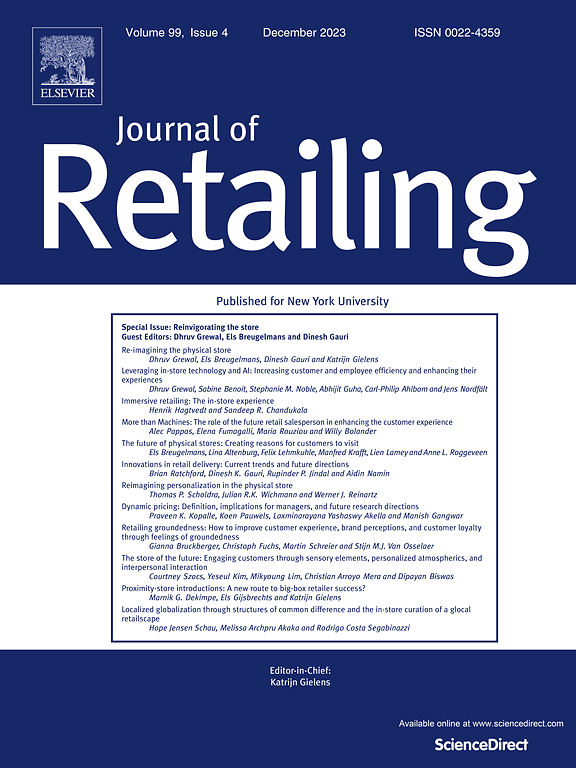Generating insult from injury: Receiving self improvement gifts causes negative word of mouth
IF 10.2
1区 管理学
Q1 BUSINESS
引用次数: 0
Abstract
Many retailers sell self improvement products – and some market these products as gifts. The present research reveals that doing so could have negative consequences. Five experiments investigated how recipients respond to self improvement gifts offering betterment in terms of physical appearance or communication skills. Results show that those who receive self improvement (vs. non improvement) gifts generate more negative word of mouth about the products they receive, for example, by giving them lower star ratings. This effect is explained by the hurt feelings that recipients of self improvement gifts experience. We identify two ways retailers can attenuate the negative word of mouth stemming from self improvement gifts. First, offering financial incentives when soliciting online reviews reduces gift recipients’ negativity. Second, using a humanized appeal when soliciting online reviews helps prevent negative product review ratings. The present findings have important implications for retailers that sell self improvement products. Specifically, retailers could use financial incentives and humanized review requests to attenuate negative word of mouth, or adjust elements of the marketing mix to nudge consumers away from selecting self improvement products as gifts.
从伤害中产生侮辱:收到自我提升的礼物会导致负面的口碑
许多零售商出售自我改善产品,有些还把这些产品作为礼品推销。目前的研究表明,这样做可能会产生负面后果。五项实验调查了收礼者对自我提升礼物的反应,这些礼物包括改善外表或沟通技巧。结果显示,那些收到自我提升礼物的人对他们收到的产品产生了更多的负面口碑,例如,给他们较低的星级评价。这种效应可以用接受自我提升礼物的人所经历的伤害感来解释。我们确定了两种方式,零售商可以减轻负面的口碑源于自我提升礼物。首先,在征求在线评论时提供经济奖励可以减少收礼者的消极情绪。其次,在征求在线评论时使用人性化的呼吁有助于防止负面产品评论评级。目前的研究结果对销售自我改善产品的零售商具有重要意义。具体来说,零售商可以使用财政激励和人性化的评论请求来减少负面的口碑,或者调整营销组合的元素,以促使消费者放弃选择自我提升的产品作为礼物。
本文章由计算机程序翻译,如有差异,请以英文原文为准。
求助全文
约1分钟内获得全文
求助全文
来源期刊

Journal of Retailing
BUSINESS-
CiteScore
15.90
自引率
6.00%
发文量
54
审稿时长
67 days
期刊介绍:
The focus of The Journal of Retailing is to advance knowledge and its practical application in the field of retailing. This includes various aspects such as retail management, evolution, and current theories. The journal covers both products and services in retail, supply chains and distribution channels that serve retailers, relationships between retailers and supply chain members, and direct marketing as well as emerging electronic markets for households. Articles published in the journal may take an economic or behavioral approach, but all are based on rigorous analysis and a deep understanding of relevant theories and existing literature. Empirical research follows the scientific method, employing modern sampling procedures and statistical analysis.
 求助内容:
求助内容: 应助结果提醒方式:
应助结果提醒方式:


